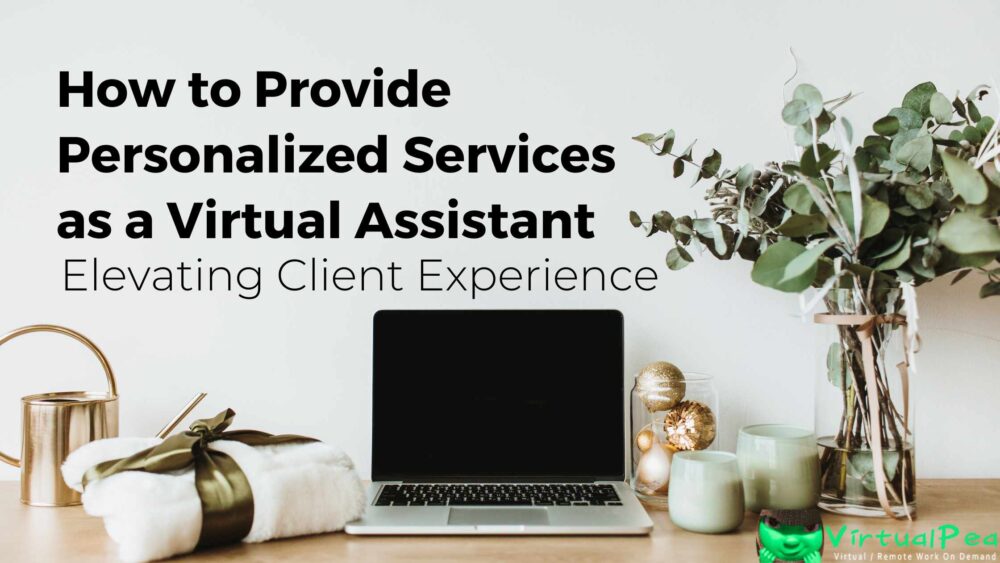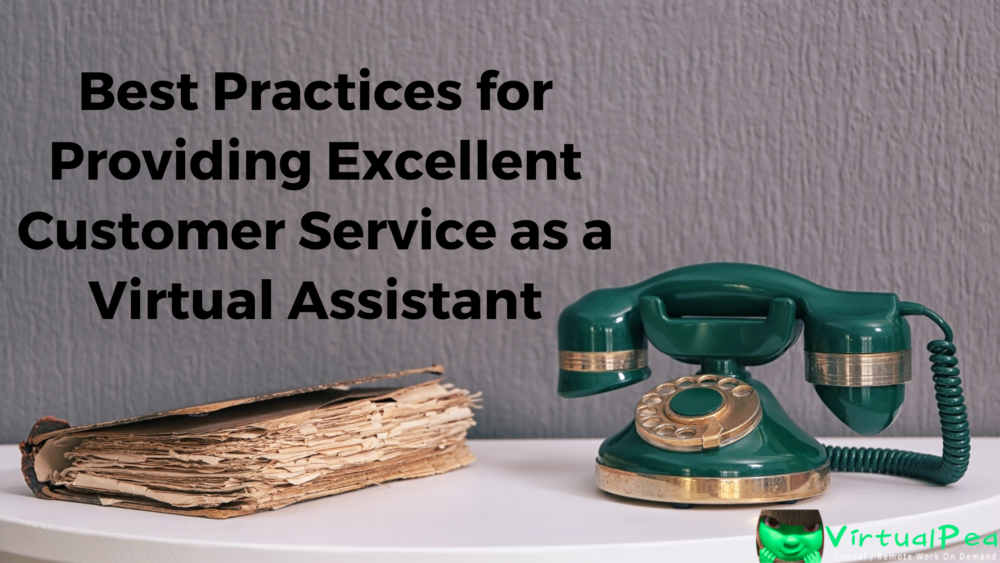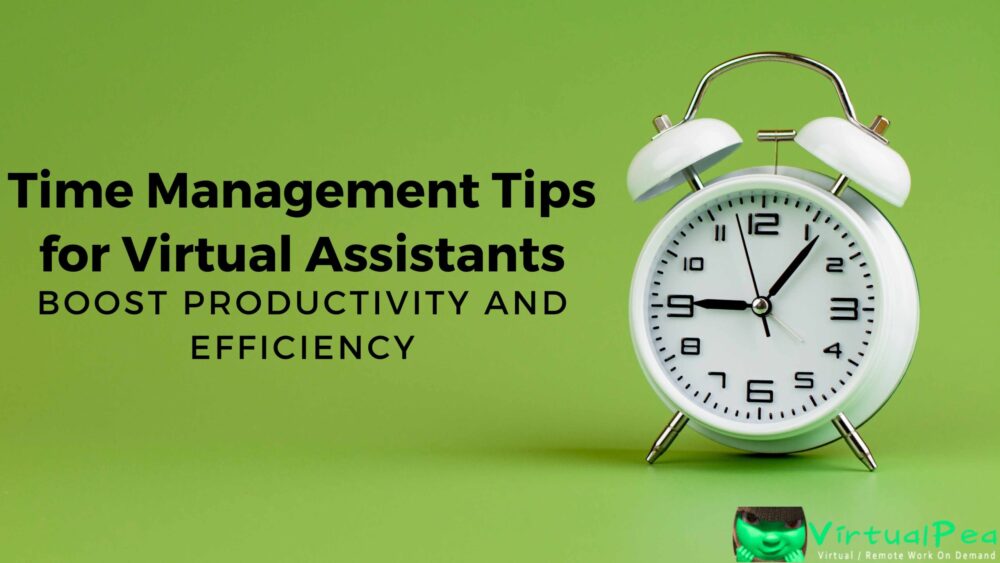
As a virtual assistant, mastering task management is crucial for delivering high-quality assistance and meeting client expectations. Effectively managing tasks helps you stay organized, prioritize your workload, and ensure timely completion of projects. In this article, we will explore practical strategies and tools to help virtual assistants enhance productivity, meet deadlines, and provide top-notch assistance through effective task management.
1. Create a Task Management System
Start by establishing a task management system that works best for you. Whether it’s a digital tool like Trello, Asana, or Todoist, or a simple spreadsheet, choose a system that allows you to list, categorize, and track your tasks effectively. This will help you stay organized and have a clear overview of your responsibilities.
2. Prioritize Tasks with Importance and Deadlines
Once you have your tasks listed, prioritize them based on their importance and deadlines. Identify urgent tasks and those that contribute to the most significant impact. Consider using the Eisenhower Matrix or similar prioritization frameworks to allocate your time and attention efficiently.
3. Break Down Projects into Manageable Steps
Complex projects can be overwhelming, so break them down into smaller, more manageable steps. This approach allows you to tackle each task one at a time, reducing stress and improving focus. Use subtasks or checklist features in your task management system to track progress and ensure all components are completed.
4. Set Realistic Deadlines
When assigning deadlines to tasks, it’s important to be realistic and consider your workload and client expectations. Avoid overcommitting and give yourself some buffer time for unexpected delays or revisions. Setting achievable deadlines promotes a sense of accomplishment and helps maintain client trust.

5. Utilize Time Blocking Techniques
Time blocking is a powerful technique to structure your workday effectively. Dedicate specific blocks of time to focus on specific tasks or task categories. This practice helps minimize distractions, improves concentration, and ensures dedicated time for important tasks. Use calendar tools or time management apps to schedule and manage your time blocks efficiently.
6. Practice Effective Communication and Collaboration
As a virtual assistant, clear and timely communication is essential for task management. Regularly update clients and team members on progress, clarify expectations, and seek clarification when needed. Utilize collaboration tools like project management platforms, shared documents, and video conferencing to enhance communication and foster collaboration.
7. Embrace Automation and Streamlining Tools
Leverage automation and streamlining tools to simplify repetitive tasks and save time. Use email templates, canned responses, and text expansion tools to respond quickly to common inquiries. Utilize task automation features within your task management system to automate recurring tasks, reminders, and notifications.
8. Regularly Review and Adjust Your Task Management Approach
Task management is an ongoing process, so regularly review and adjust your approach as needed. Reflect on your productivity levels, identify areas for improvement, and experiment with different techniques or tools. Continuous evaluation and adaptation will help you optimize your task management practices.
Effective task management is a key skill for virtual assistants to enhance productivity, meet deadlines, and provide top-notch assistance. By establishing a task management system, prioritizing tasks, breaking down projects, setting realistic deadlines, utilizing time blocking techniques, practicing effective communication, embracing automation tools, and regularly reviewing and adjusting your approach, you can excel in managing tasks and deliver exceptional results to clients. Mastering task management will not only boost your efficiency but also contribute to your professional success as a virtual assistant.

As a virtual assistant, achieving a healthy work-life balance can be a challenge. The flexible nature of remote work often blurs the lines between professional and personal life. However, it’s essential to prioritize your well-being to avoid burnout and maintain a fulfilling career. In this article, we will explore practical strategies for managing work-life balance as a virtual assistant. By implementing these tips, you can establish boundaries, manage your time effectively, and take care of yourself, leading to increased productivity and overall satisfaction.
1. Set Clear Boundaries
Establishing boundaries is crucial for maintaining work-life balance. Clearly define your working hours and communicate them to clients and colleagues. Avoid checking emails or working outside of these designated hours to preserve personal time. Create a physical or virtual workspace that signals when you’re “on” or “off” duty to help differentiate between work and leisure.
2. Prioritize and Schedule Tasks
Effective time management is key to balancing work and personal life. Prioritize tasks based on importance and urgency. Use productivity tools or techniques, such as time blocking or the Pomodoro technique, to structure your workday and ensure focused periods of productivity. Set realistic goals and deadlines to avoid overcommitting and feeling overwhelmed.
3. Practice Self-Care
Taking care of yourself is vital for maintaining work-life balance. Incorporate self-care activities into your daily routine, such as exercise, meditation, or hobbies. Allocate time for breaks throughout the day to recharge and rejuvenate. Establish healthy boundaries with technology, ensuring you disconnect from work and engage in activities that bring you joy and relaxation.

4. Delegate and Outsource
As a virtual assistant, you have the freedom to delegate or outsource tasks that don’t require your expertise. Identify areas where you can leverage the support of other professionals or virtual assistants. Delegating administrative or repetitive tasks allows you to focus on high-value activities, reducing stress and improving work-life balance.
5. Communicate Effectively
Maintain open and honest communication with clients and colleagues regarding your availability and boundaries. Set realistic expectations regarding response times and deliverables. Clearly communicate your working hours and any potential limitations in advance. This proactive communication fosters understanding and respect, ensuring a healthy work-life balance.
6. Learn to Say No
As a virtual assistant, it’s essential to recognize your limitations and learn to say no when necessary. Overcommitting yourself can lead to burnout and imbalance. Evaluate requests or projects carefully, considering your capacity and priorities. Politely decline opportunities that don’t align with your goals or would negatively impact your work-life balance.
Achieving work-life balance as a virtual assistant requires intentional effort and self-awareness. By setting clear boundaries, managing your time effectively, practicing self-care, delegating tasks, communicating openly, and learning to say no, you can strike a harmonious balance between your professional and personal life. Prioritizing your well-being not only enhances your productivity but also ensures long-term success and satisfaction in your virtual assistant career. Embrace these strategies and take proactive steps towards a healthier work-life balance.

As a virtual assistant, strong organizational skills are essential for managing multiple tasks, meeting deadlines, and delivering high-quality work. In this blog post, we will provide you with valuable tips to enhance your organizational skills as a virtual assistant. By implementing effective time management strategies, task prioritization techniques, and workflow optimization methods, you can boost your efficiency and productivity, ensuring smooth operations and client satisfaction.
1. Master Time Management
Effective time management is crucial for virtual assistants. Start by creating a daily or weekly schedule that outlines your tasks and deadlines. Break down larger projects into smaller, manageable tasks and allocate specific time slots for each. Use digital calendars, task management apps, or productivity tools to stay organized and track your progress. Set realistic deadlines and build in buffer time for unexpected events or contingencies.
2. Prioritize Tasks Strategically
Prioritizing tasks allows you to focus on the most important and time-sensitive activities. Use techniques like the Eisenhower Matrix or ABC analysis to categorize tasks based on their urgency and importance. Focus on high-priority tasks first and tackle low-priority tasks later. Regularly reassess priorities as new tasks emerge or circumstances change.
3. Optimize Your Workflow
Streamline your workflow to minimize wasted time and improve efficiency. Identify bottlenecks or areas where you frequently encounter challenges and find solutions to overcome them. Organize your digital and physical files using a consistent naming convention and folder structure for easy retrieval. Utilize project management tools or collaboration platforms to centralize communication, document sharing, and task tracking.

4. Utilize Productivity Tools and Automation
Leverage productivity tools and automation to streamline repetitive tasks and save time. Use tools for email management, social media scheduling, task automation, and project tracking. Automate email responses or set up templates for common inquiries to minimize manual typing. Explore tools that integrate with your workflow to enhance efficiency and reduce manual effort.
5. Establish Effective Communication Channels
Clear and timely communication is essential for effective virtual assistance. Establish preferred communication channels with clients and team members, ensuring efficient and prompt responses. Utilize tools like video conferencing, instant messaging, or project management platforms to facilitate communication and collaboration. Regularly update clients on task progress and seek clarification when needed.
6. Implement Regular Review and Reflection
Take time to review and reflect on your organizational practices regularly. Assess the effectiveness of your systems, identify areas for improvement, and implement necessary changes. Learn from your experiences and adapt your organizational strategies accordingly. Embrace a growth mindset, seeking continuous improvement and refining your organizational skills over time.
Enhancing your organizational skills as a virtual assistant is crucial for maintaining efficiency and delivering exceptional results. By mastering time management, strategically prioritizing tasks, optimizing your workflow, utilizing productivity tools and automation, establishing effective communication channels, and implementing regular review and reflection, you can become a highly organized and successful virtual assistant. Stay committed to honing your organizational skills and watch your productivity soar, leading to increased client satisfaction and professional growth.

As a virtual assistant, offering personalized services is key to standing out in a competitive market and ensuring client satisfaction. Personalization goes beyond providing generic support and involves tailoring your approach to meet each client’s unique needs and preferences. In this article, we will explore effective strategies for providing personalized services as a virtual assistant, enabling you to deliver customized solutions and elevate the client experience.
1. Understand Your Client’s Goals and Expectations
To provide personalized services, it’s crucial to have a deep understanding of your client’s goals, expectations, and pain points. Take the time to communicate with your client, ask thoughtful questions, and actively listen to their needs. This insight will help you align your services and deliver tailored solutions that meet their specific objectives.
2. Customize Your Approach
Tailor your approach to match each client’s preferences and working style. Adapt your communication methods, collaboration tools, and project management processes to suit their specific requirements. By adjusting your approach, you demonstrate your flexibility and commitment to providing a personalized experience.
3. Offer a Range of Services
Expand your skill set and service offerings to provide clients with a comprehensive range of options. By diversifying your expertise, you can cater to different client needs and offer specialized services in various areas. This flexibility allows you to meet the specific demands of each client and provide a personalized service package.

4. Regularly Seek Feedback
Feedback is invaluable for improving your services and tailoring them to your client’s satisfaction. Regularly request feedback from clients to understand their experiences, identify areas for improvement, and address any concerns. Actively implementing client feedback demonstrates your commitment to delivering personalized and client-centric services.
5. Stay Up-to-Date with Industry Trends
To provide personalized services, it’s essential to stay informed about the latest trends and developments in your industry. By staying up-to-date, you can offer clients innovative solutions and insights that align with current industry best practices. This proactive approach showcases your expertise and enhances the value you bring to clients.
6. Develop Strong Relationships
Building strong relationships with clients is fundamental to delivering personalized services. Invest time in fostering meaningful connections, maintaining open lines of communication, and demonstrating your dedication to their success. By developing strong relationships, you can better understand their evolving needs and consistently provide personalized support.
Providing personalized services as a virtual assistant is essential for differentiating yourself in the market and ensuring client satisfaction. By understanding your client’s goals, customizing your approach, offering a range of services, seeking feedback, staying up-to-date with industry trends, and developing strong relationships, you can deliver tailored solutions and elevate the client experience. Implement these strategies to provide exceptional personalized services and cultivate long-lasting client partnerships.

As a virtual assistant, providing excellent customer service is crucial for building strong client relationships and fostering satisfaction. Despite working remotely, you can still deliver top-notch service by implementing effective strategies. In this article, we will explore the best practices for providing exceptional customer service as a virtual assistant. From effective communication and responsiveness to proactive problem-solving and professionalism, these practices will help you exceed client expectations and thrive in your role.
1. Master Communication Skills
Clear and efficient communication is the foundation of excellent customer service. Maintain regular and open lines of communication with your clients, utilizing channels like email, instant messaging, or video calls. Actively listen to their needs, ask clarifying questions, and provide timely and concise responses. Ensure that your messages are professional, courteous, and free from any misunderstandings. Effective communication builds trust and fosters a positive working relationship with your clients.
2. Be Responsive and Timely
Timeliness is crucial in a remote working environment. Respond promptly to client inquiries, emails, or requests, even if it is just to acknowledge receipt. Set clear expectations regarding response times and availability, ensuring that you meet or exceed them consistently. If you are unable to address a client’s request immediately, communicate a timeline for when they can expect a resolution. Being responsive and timely demonstrates your commitment to client satisfaction.

3. Proactively Solve Problems
Anticipate and proactively address potential issues before they become problems for your clients. Actively seek ways to streamline processes, improve efficiency, and enhance the overall client experience. Offer suggestions and solutions when you identify areas for improvement. By taking a proactive approach, you demonstrate your commitment to providing exceptional service and alleviating potential frustrations.
4. Maintain Professionalism
Maintaining professionalism is vital as a virtual assistant. Present yourself in a polished and professional manner, both in written and verbal communications. Adhere to deadlines and deliverables, honoring your commitments. Respect client confidentiality and handle sensitive information securely. When facing challenges or conflicts, maintain a calm and professional demeanor, striving for effective resolution. Professionalism instills confidence in your clients and reinforces your commitment to delivering high-quality service.
5. Seek Feedback and Continuously Improve
Regularly seek feedback from your clients to understand their satisfaction levels and identify areas for improvement. Encourage open and honest communication, welcoming suggestions or critiques. Act on feedback by making necessary adjustments and incorporating lessons learned into your future interactions. Continuous improvement demonstrates your dedication to delivering exceptional customer service and strengthens client relationships.
Delivering excellent customer service as a virtual assistant is achievable by implementing these best practices. Mastering communication skills, being responsive, proactively solving problems, maintaining professionalism, and seeking feedback will help you exceed client expectations and establish long-lasting relationships. By providing exceptional customer service, you enhance client satisfaction, foster loyalty, and differentiate yourself in the virtual assistant industry.

As a virtual assistant, maximizing productivity is essential to accomplish tasks efficiently and provide exceptional service to clients. In 2023, there are various productivity hacks and techniques available that can help virtual assistants streamline their workflow and achieve more in less time. In this article, we will explore some effective productivity hacks for virtual assistants.
1. Set Clear Goals and Prioritize Tasks
Start each day by setting clear goals and priorities. Identify the most important tasks that require immediate attention and focus on completing them first. Break down larger tasks into smaller, manageable steps to avoid feeling overwhelmed. By setting clear goals and prioritizing tasks, you can stay organized and ensure that critical work is accomplished.
2. Use Time-Blocking Techniques
Time-blocking is a powerful technique to manage your schedule effectively. Allocate specific blocks of time for different tasks or types of work. For example, dedicate one block for client communication, another for administrative tasks, and another for focused project work. By assigning dedicated time slots to specific activities, you can minimize distractions and work with increased focus and efficiency.

3. Leverage Automation Tools
Take advantage of automation tools to streamline repetitive and time-consuming tasks. Use email automation for sending routine messages or follow-ups. Employ project management tools to streamline collaboration and task tracking. Explore social media scheduling tools to plan and automate social media posts. By automating tasks, you can save time and free up mental space for more important responsibilities.
4. Practice the Pomodoro Technique
The Pomodoro Technique is a popular time management method that involves working in focused sprints followed by short breaks. Set a timer for 25 minutes and work on a specific task with full concentration. After the timer goes off, take a short 5-minute break. Repeat this cycle four times and then take a longer break of 15-30 minutes. This technique helps maintain focus and prevent burnout.
5. Minimize Distractions
Create a distraction-free work environment to enhance productivity. Minimize distractions by turning off notifications on your devices, closing unnecessary tabs or applications, and setting boundaries with family or roommates. Consider using noise-cancelling headphones or ambient background noise to drown out distractions. By creating a focused environment, you can work more efficiently and accomplish tasks more quickly.
By implementing these productivity hacks, virtual assistants can optimize their workflow and accomplish tasks more efficiently in 2023. Set clear goals, prioritize tasks, and leverage time-blocking techniques to manage your schedule effectively. Explore automation tools to streamline repetitive tasks and free up time for more important responsibilities. Practice the Pomodoro Technique to maintain focus and avoid burnout. Finally, create a distraction-free work environment to enhance productivity. Embrace these productivity hacks and watch your efficiency soar as a virtual assistant.

As the virtual assistance industry continues to grow and evolve, it is crucial for virtual assistants to possess a range of essential skills to succeed in their roles. In 2023, the demands of remote work require virtual assistants to be adaptable, highly skilled in communication, efficient in time management, and technically proficient. In this article, we will explore the key skills that every virtual assistant should have to thrive in the dynamic landscape of virtual assistance.
1. Effective Communication Skills
Strong communication skills are fundamental to the success of a virtual assistant. Virtual assistants must be proficient in written and verbal communication to effectively collaborate with clients and team members. Clear and concise communication ensures that tasks are understood, expectations are managed, and feedback is conveyed promptly. Active listening, professionalism, and the ability to adapt communication styles to different clients or projects are vital skills for virtual assistants.
2. Time Management and Organization
As a virtual assistant, excellent time management and organizational skills are crucial. Virtual assistants are responsible for juggling multiple tasks, meeting deadlines, and maintaining productivity. Effective time management involves prioritizing tasks, setting realistic goals, and utilizing tools and techniques to optimize productivity. Organizational skills ensure that files, documents, and project details are well-structured and easily accessible, facilitating efficient workflow and seamless collaboration.

3. Adaptability and Flexibility
The remote work landscape is dynamic, requiring virtual assistants to be adaptable and flexible. Clients’ needs may change, new technologies may emerge, and project scopes may evolve. Virtual assistants must be able to adapt quickly to these changes, embrace new processes or tools, and find innovative solutions. An adaptable mindset enables virtual assistants to thrive in a fast-paced and ever-changing environment, offering valuable support to clients.
4. Technical Proficiency
Being technically proficient is a must for virtual assistants in 2023. Virtual assistants should have a solid foundation in various software applications, project management tools, and communication platforms. Proficiency in productivity tools like Microsoft Office or Google Workspace, project management tools like Trello or Asana, and communication platforms like Slack or Zoom is essential. Staying up to date with emerging technologies and continually expanding technical skills is vital for virtual assistants to provide efficient and effective support.
5. Problem-Solving Abilities
Virtual assistants often encounter challenges and obstacles while handling tasks or projects. The ability to think critically and solve problems is a valuable skill in the virtual assistance role. Virtual assistants should be resourceful, proactive, and able to analyze situations to identify solutions. They should be comfortable seeking information, asking questions, and collaborating with team members to overcome obstacles and deliver high-quality work.
To excel as a virtual assistant in 2023, possessing essential skills is crucial. Effective communication, time management, and organizational abilities are foundational skills for success. Adaptability and flexibility enable virtual assistants to navigate the ever-changing remote work environment. Technical proficiency and problem-solving skills enhance efficiency and support clients effectively. Continually honing these skills through professional development opportunities will ensure virtual assistants remain competitive and provide exceptional support to clients.

Virtual assistants play a vital role in today’s fast-paced business environment, providing valuable support to clients remotely. To excel in this dynamic role, virtual assistants must master the art of time management. Effectively managing your time ensures that you maximize productivity, meet deadlines, and deliver exceptional service to your clients. In this article, we will explore essential time management tips for virtual assistants, including efficient task management, prioritization techniques, effective scheduling strategies, and the importance of time tracking.
1. Efficient Task Management
Efficient task management is the foundation of effective time management. Start by creating a comprehensive task list that outlines all your responsibilities and deadlines. Break down larger projects into smaller, manageable tasks. Utilize task management tools or digital project management platforms to keep track of your tasks, set reminders, and prioritize your workload. Regularly update your task list to reflect changing priorities and ensure nothing falls through the cracks.
2. Prioritization Techniques
Prioritizing tasks is essential for optimizing your time and energy. Use techniques like the Eisenhower Matrix or the ABC method to categorize tasks based on urgency and importance. Identify high-priority tasks that require immediate attention and focus on completing those first. By tackling urgent and important tasks early on, you can alleviate stress and create a sense of accomplishment, setting a positive tone for the rest of your workday.

3. Effective Scheduling Strategies
Creating a well-structured schedule is key to effective time management as a virtual assistant. Start by blocking out specific time slots for different types of tasks, such as client meetings, administrative work, and project deadlines. Schedule uninterrupted time for focused work, minimizing distractions. Be realistic about the time required for each task, allowing for contingencies and unexpected interruptions. Leverage digital calendars or scheduling tools to manage your appointments and deadlines efficiently.
4. Time Tracking
Tracking your time allows you to gain insights into your productivity patterns and identify areas for improvement. Use time tracking tools or apps to record the time spent on each task. This practice not only helps you stay accountable but also provides valuable data for evaluating your efficiency and optimizing your workflow. Analyze your time logs regularly to identify time-consuming activities, streamline processes, and identify opportunities for delegation or automation.
5. Avoiding Multitasking
While multitasking may seem like a productivity booster, it often leads to decreased efficiency and increased errors. Instead, focus on single-tasking by dedicating your attention to one task at a time. Complete it before moving on to the next. This approach allows for better concentration, higher quality work, and faster task completion. Avoid the temptation to switch between multiple tasks simultaneously, as it can lead to decreased productivity and increased stress.
Effective time management is a crucial skill for virtual assistants, enabling them to maximize productivity, deliver high-quality work, and maintain a healthy work-life balance. By implementing efficient task management techniques, prioritizing tasks, creating effective schedules, tracking your time, and avoiding multitasking, you can optimize your efficiency and excel in your virtual assistance career. Remember, mastering time management takes practice, so embrace these tips and continuously refine your approach to achieve professional success as a virtual assistant.
